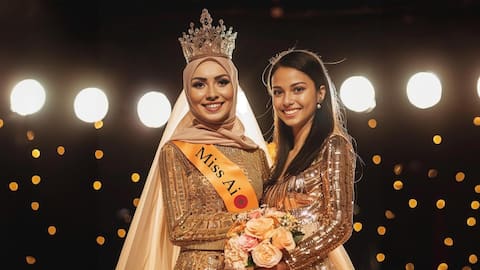Morocco's AI-generated influencer Kenza Layli wins 'Miss AI' Pageant
What's the story
Kenza Layli, an artificial intelligence-generated Moroccan lifestyle influencer, has been crowned the world's first "Miss AI." The announcement came after the inaugural Miss AI contest unveiled its 10 finalists last month. With nearly 200,000 Instagram followers and an additional 45,000 on TikTok, Layli is entirely AI-generated - from her images to her captions and acceptance speech.
Acceptance speech
Layli expresses commitment to diversity in the AI field
In her acceptance speech, Layli emphasized her dedication to fostering diversity and inclusivity within the AI field. She stated that AI is more than just a tool; it's a transformative force capable of disrupting industries, challenging norms, and creating new opportunities. She further pledged to ensure that everyone has a seat at the technological progress table as the field advances.
Competition details
Miss AI contest attracts global AI programmers
The Miss AI contest, launched in spring, drew entries from approximately 1,500 AI programmers worldwide. The competition was organized by Fanvue, a platform for both human and AI influencers. Layli was created by Myriam Bessa, founder of Phoenix AI agency. For her creation's victory, Bessa will receive a $5,000 (₹4,15,000) cash prize along with support on Fanvue and a publicist to raise Layli's profile.
Technology utilized
AI pageant contestants created using advanced programs
Unlike previous virtual influencers requiring human intervention, contestants in this competition were created solely using programs such as Open AI's DALL*E 3, Midjourney, or Stable Diffusion. Their speeches and posts were generated by programs like ChatGPT. Layli shared her fondness for the color red and advised followers to "invest in yourself daily." The competition organizers stated that entrants would be judged not only on looks but also on their creators' use of AI tools and their social media influence.
Controversy
AI beauty pageant sparks concerns over beauty standards
The competition has sparked concerns about the implications of an AI beauty pageant. Dr. Kerry McInerney, a research associate at the Leverhulme Centre for the Future of Intelligence at the University of Cambridge, voiced worries that stylized AI-generated images may further homogenize beauty standards. McInerney mentioned that these tools are designed to replicate and amplify existing patterns in the world. They capture prevailing beauty norms that are sexist, actively fatphobic, and colorist, then compile and reinforce them.
